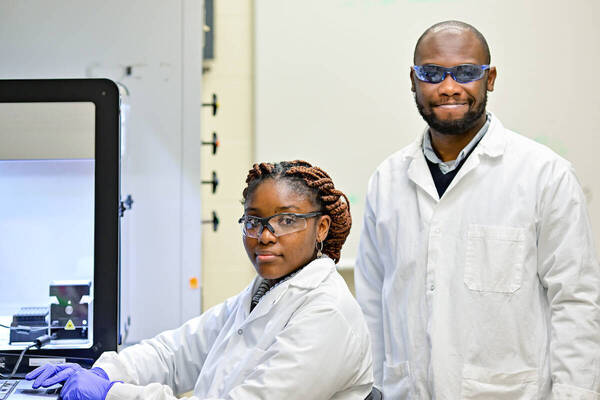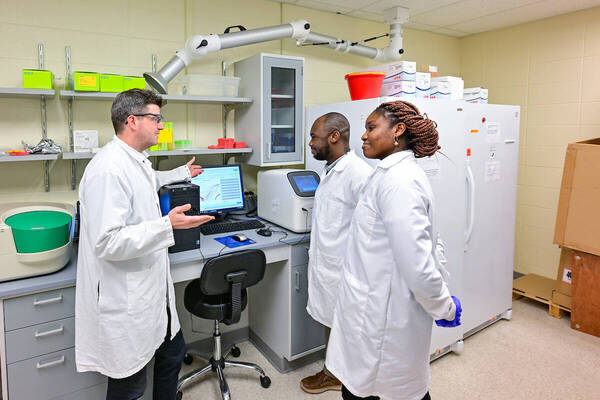As he searched for potential postdoctoral positions, Tolulope “Kay” Kayode took to Twitter to find researchers in the United States who studied malaria, his area of interest.

Kayode, who holds a doctoral degree in microbiology, and his wife, Temitope “Mercy” Adeyemi-Kayode, who holds her doctorate in electrical engineering, hoped to find positions at the same university but knew that could be tricky. First, their search began during the height of the COVID-19 pandemic in 2021. And Adeyemi-Kayode delivered their first child, Oluwadabira, whom they call “Dabbie,” in May 2020.
But Kayode persisted, reaching out to researchers he thought he would enjoy working with. He ran across a post by Cristian Koepfli, assistant professor in the Department of Biological Sciences, whose lab developed a new type of molecular assay that can be used to detect a gene deletion that prevents malaria from being detected with simple field-based tests.
Koepfli didn’t have any open positions when Kayode first contacted him. But he had an opportunity for Kayode this year, and also realized he could use Adeyemi-Kayode’s engineering skills too. So now the postdoctoral pair, both from Nigeria, are in the unusual situation of working in the same lab.
“Part of what we were interested in is actually working with people who were doing research that pertains to Africa,” Kayode said.
“When Cristian said he had a couple of projects I could work on in the lab as well, that I would also be a good fit based on his research, I didn’t want to pass that up,” Adeyemi-Kayode said, adding that she was a bit unsure because they now have a toddler. “My mind was getting pulled in all directions; I wanted to rest, right? But I am a person who likes to work, and I knew that maybe after being in the U.S. for two or three weeks I would have been bored out of my mind.”
Adeyemi-Kayode has been working steadily on robotic hardware and software that will complete batch pipetting for extracting DNA from blood samples. Through her work she’s gotten the machine running — the device contains a pipetting head that suctions blood, then moves to an area within the machine for mixing before finally dispensing the samples into a container — it’s not quite yet as accurate as the team would like. She will also review satellite information and complete data analysis that will predict malaria transmissions across different populations in Africa.
While her work is primarily lab- and data-driven, Kayode’s work focuses on molecular and genomic aspects. Malaria is caused by parasites that are transmitted to people through the bite of infected mosquitoes. Often the amount of the parasite in the blood is low and thus difficult to detect using the diagnostic tools, like microscopes, in countries including Nigeria, where malaria is endemic. Kayode’s work ranges from the detection of very low-density infections in blood samples by molecular testing to genomic analysis of the parasite in order to understand the spread of drug resistance, as well as the ability to evade detection by rapid diagnostic tests.
Kayode will likely assist Koepfli by traveling to various countries to collect additional data, and train people in laboratory techniques.
The couple said they have been impressed by the hospitality of their lab mates, and have enjoyed living in South Bend despite the cold winters (they noted being surprised that sunshine doesn’t necessarily mean warmth). For people considering completing a postdoctoral assignment at Notre Dame or another institution, Kayode suggests they take several factors into consideration.
“Location is important, but for me, what’s more important is the lab, because if you’re in the wrong lab or the wrong system, you can’t really change that — you can’t be that person leaving in three months,” he said, adding that they were completely comfortable with Koepfli from the first conversation.
Coming from Nigeria, however, they were concerned about potential racism. They assumed it would touch many aspects of their lives, and thought there was rampant police brutality in every city. But during their first month in a rental in South Bend they became close with the owner who “basically became our U.S. mom,” Kayode said, and noted that Cristian helped find a daycare for Dabbie. Another lab member, Tiffany Huwe, drove them everywhere until they purchased a vehicle.
“So, the weather is not great, but the people here are nice; the school is great, and the science is great,” Kayode said.

Both researchers are unsure if they want to work full-time in academia after completing their postdoctoral jobs, but they aren’t ruling it out. For Kayode, that’s a strong second.
“I know I’m cut out for research, but it is pretty stressful, so I would like to help agencies with health policies, decision making, doing something to help the continent of Africa,” he said.
Adeyemi-Kayode is interested in someday developing science and engineering curricula for children, but she's not done learning yet (and never will be).
“My superpower is actually learning, soaking up as much information as possible as fast as I can,” she said. “At the end of this period, I hope I get to contribute in a very, very massive way.”